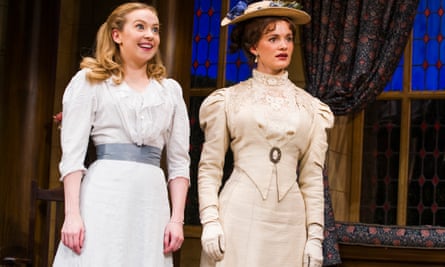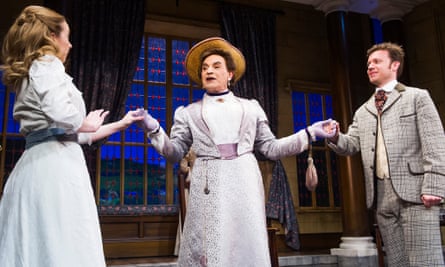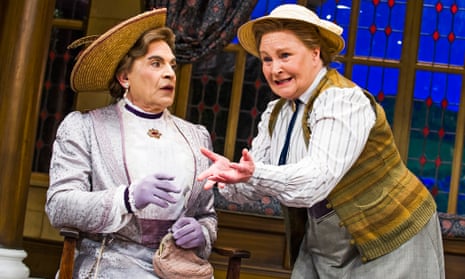There is little doubt as to the impulse behind this production. The image of a berouged David Suchet as Lady Bracknell, gazing at us from under a tilted, feathered hat, dominates the posters. He gives, as you would expect, a majestically funny performance in an Adrian Noble production that plays up Wilde’s farcical exuberance at the expense of his running commentary on Victorian life.
As Lady Bracknell, Suchet does not so much enter a room as occupy it totally. He is also a master, like Donald Sinden, of the frozen stare of disdain. On his first encounter with Jack Worthing, he briskly surveys him as if he were a superfluous item of furniture. His interest quickens only when he realises Mr Worthing is a prospective suitor to his daughter, Gwendolen; the resulting interview scene is the highlight of the evening.
What is fascinating is how Suchet literally skirts the obvious traps. He hints at Lady Bracknell’s methodical mercenariness by producing a notebook, in which to itemise Mr Worthing’s assets with glittering precision. He also reserves his shocked amazement for the discovery that Mr Worthing ) was “found”, at which his voice rises in an arc of furious incredulity: in contrast, the realisation that Jack was deposited in a handbag produces only a gleeful titter.
This is a Lady Bracknell who combines a calculating mind with a sense of life’s absurdity. The point is reaffirmed in the second great scene, where Lady Bracknell’s interest in her nephew’s intended, Cecily, rises in proportion to the revelation of her fortune. The one blot on an excellent performance is Suchet’s suggestion that Lady Bracknell’s disclosure of her own arriviste origins is unwitting: gorgons of this stature don’t make mistakes.

That moment also symbolises Noble’s occasional indifference to the play’s social subtext. One of Wilde’s key points is that in Victorian England one could buy one’s way into the aristocracy, and Lady Bracknell is not ashamed of the fact. The play offers a flow of insights into marriage, money, morals and, most especially, a society that maintains a facade of hypocritical respectability. For that reason, I think Michael Benz could lend Jack Worthing, who leads a carefully planned double-life, a touch more ostentatious gravitas.
But the virtue of the production is that it presents us with real people rather than epigram-spouting puppets. There is a genuine sexual charge between Philip Cumbus’s Algernon and Imogen Doel’s Cecily, who can barely keep their hands off each other. The former’s insatiable appetite is neatly symbolised by his reckless consumption of muffins, while the latter’s cloistered existence is marked by her shocked awareness that she is sitting on a financial fortune.

Emily Barber’s Gwendolen also slyly hints that she has inherited her mother’s imperious tendencies, and Michele Dotrice’s Miss Prism and Richard O’Callaghan’s Canon Chasuble are both endowed with an unusual flirtatious skittishness.
Even if occasionally the mood seems closer to Charley’s Aunt than Oscar Wilde, this is a thoroughly enjoyable production and, at its centre, lies a superb performance by Suchet that reminds us that even Lady Bracknell contains a certain impishness beneath her elegantly frocked hauteur.

Comments (…)
Sign in or create your Guardian account to join the discussion